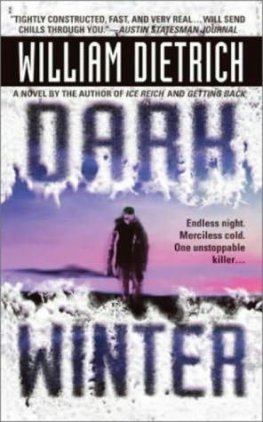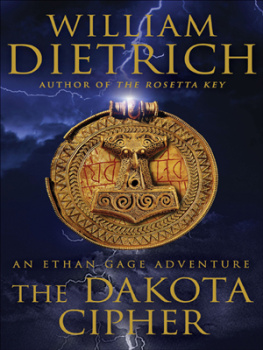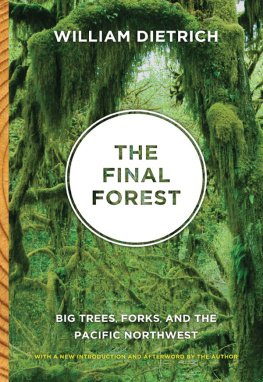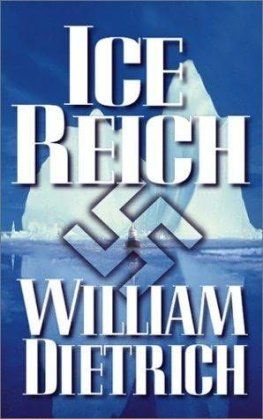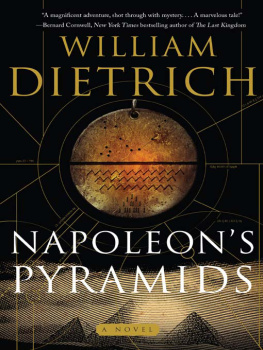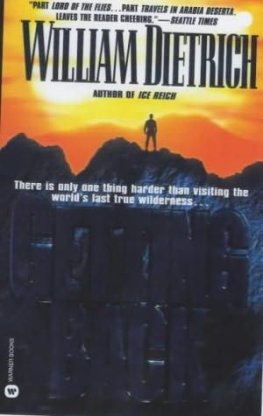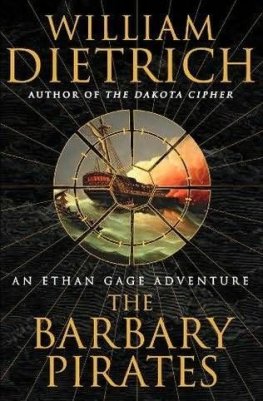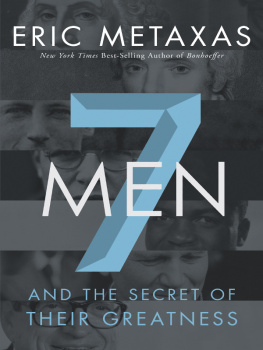William Dietrich - Dark Winter
Here you can read online William Dietrich - Dark Winter full text of the book (entire story) in english for free. Download pdf and epub, get meaning, cover and reviews about this ebook. genre: Adventure. Description of the work, (preface) as well as reviews are available. Best literature library LitArk.com created for fans of good reading and offers a wide selection of genres:
Romance novel
Science fiction
Adventure
Detective
Science
History
Home and family
Prose
Art
Politics
Computer
Non-fiction
Religion
Business
Children
Humor
Choose a favorite category and find really read worthwhile books. Enjoy immersion in the world of imagination, feel the emotions of the characters or learn something new for yourself, make an fascinating discovery.
- Book:Dark Winter
- Author:
- Genre:
- Rating:5 / 5
- Favourites:Add to favourites
- Your mark:
- 100
- 1
- 2
- 3
- 4
- 5
Dark Winter: summary, description and annotation
We offer to read an annotation, description, summary or preface (depends on what the author of the book "Dark Winter" wrote himself). If you haven't found the necessary information about the book — write in the comments, we will try to find it.
Dark Winter — read online for free the complete book (whole text) full work
Below is the text of the book, divided by pages. System saving the place of the last page read, allows you to conveniently read the book "Dark Winter" online for free, without having to search again every time where you left off. Put a bookmark, and you can go to the page where you finished reading at any time.
Font size:
Interval:
Bookmark:
William Dietrich
Dark Winter
CHAPTER ONE
Sometimes you have to go into nothing to get what you want.
That was the Jed Lewis theory, anyway. West Texas oil patch, Saudi, the North Slope. Hadn't worked for him yet but one kind of extreme had led to another, one kind of quest to its polar opposite. Sometimes life patterns like that, when you keep changing your mind about what it is you do want. So now he'd come to the very end of the world and was peering over its edge, too late to turn back, hoping that in the farthest place on earth he'd finally fit in. Atone to himself for his own confusion of purpose. Belong.
Maybe.
"The Pole!" Jim Sparco had seduced him. "Feels closer to the stars than anyplace on earth. It's high desert, a desert of ice, and the air's so dry that it feels like you can eat the stars. Bites of candy." The climatologist had gripped his arm. "The South Pole, Lewis. It's there you realize how cold the universe really is."
The money had almost been secondary. They'd understood each other, Sparco and he, this longing for the desolate places. A place uncomplicated. Pure.
Except for their rock, of course. That raised questions. It was their pebble, their tumor, their apple.
***The world is round but it has an edge. A cold crustal wrinkle called the Trans-Antarctic Range runs for more than a thousand miles and divides Antarctica in two. On the north side of the mountains is a haunting but recognizable landscape of glacier and mountain and frozen ocean: an Ice Age world, yes, but still a world- our world. To its south, toward the Pole, is an ice cap so deep and vast and empty as to seem unformed and unimagined. A vacuum, a blank. The white clay of God.
Lewis crossed in the sinking light of an Antarctic autumn. He was exhausted from thirty hours of flying, constricted by thirty-five pounds of polar clothing, and weary of the noisy dimness of the LC-130 military transport plane, its webbed seats pinching circulation and its schizophrenic ventilation blowing hot and cold.
He was also entranced by beauty. The sun was slowly dipping toward six-month night and the aqua crevasses and sugared crags below were melodramatic with blaze and shadow. Golden photons, bouncing off virginal snow, created a hazed fire. Frozen seas looked like cracked porcelain. Unnamed peaks reared out of fogs thick as frosting, and glaciers grinned with splintery teeth attached to blue gums. It was all quite primeval, untrodden and unspoiled, a white board on which to redraw yourself. The kind of place where he could be whatever he made himself, whatever he announced himself, to be.
The Trans-Antarctic Range is like a dam, however, holding behind it a plateau of two-mile-thick polar ice like a police line braced against a pressing crowd. A hundred thousand years of accumulated snowfall. A few peaks at the edge of the ice plateau bravely poke their snouts up as if to tread water but then, farther south, relief disappears altogether. The glaciers vanish. So do ridges, crevasses, and theatrical light. What follows is utter flatness, a frozen mesa as big as the contiguous United States. When the airplane crossed the mountains it entered something fundamentally different, Lewis realized. It was then that his excitement began to turn to disquiet.
Imagine an infinite sheet of paper. No, not infinite, because the curve of the earth provides a kind of boundary. Except that the horizon itself is foggy and indistinct with floating ice crystals, suspended like diamond dust, so that the snow merges without definition into pale sky. There was nothing to see from the tiny scratched windows of the National Guard transport: no relief, no reference point, no imperfection. When he thought he saw undulations in the snow the load master informed him he was merely looking at the shadow of cirrus clouds far overhead. When he thought he saw a track across the snow- left by a tractor or snowmobile, perhaps- the load master pointed to a contrail being left by an outgoing transport. His track was the shadow of that dissipating streak across the sky.
Lewis moved among the pallets of cargo from window to window, waiting for something to happen. Nothing did. The plane lumbered on, cold slithering along its fuselage.
He checked his watch, as if it still meant anything in a place where the sun went haywire, and looked out again.
Nothing.
He looked out a different window. No movie would start on the blank screen below. No progress could be discerned. He searched a sky and plateau that seemed blank mirrors of each other, vainly searching for some rip, some imperfection, some reassurance that he was someplace.
Nothing.
He sat on his web seat and chewed a cold lunch.
After a drag of time the Guardsman cuffed his shoulder and Lewis stood again, looking where the sergeant pointed. Far away there was a pimple on the vastness. A tiny bug, a freckle, a period with a white runway attached to make a kind of exclamation mark. Amundsen-Scott base! Named by Americans for the Norwegian who got there first in 1912, and the hard-luck Brit who froze to death weeks later after seconding at point zero. Lewis made out a bottlecap of a dome that sheltered the South Pole's central buildings and an orbit of smaller structures like specks of sand. From the air the human settlement was remarkable only for its insignificance.
"The buildings fit in a circle about a mile wide, altogether," the load master shouted to him over the roar of the engines. "Doesn't look like much, does it?"
Lewis didn't reply.
"You staying the winter?"
He shrugged.
"Glad it's you and not me!"
They buckled in, the snow seeming to swell up to meet them, Lewis's heart accelerating during that disquieting gap between air and ground, and then with a thump and a bang they were down, swerving slightly as the skis skidded on the ice. The plane shuddered as it taxied, continuing to vibrate when it stopped because the pilots didn't dare shut down the engines.
Lewis stood, stiff and apprehensive. He was the only passenger, the last arrival of the season. An anti-migrant, swimming against the tide of humans fleeing north. Well, his timing had never been the best. The cargo ramp opened to a shriek of white and the cold hit him like a slap. It was palpable, like a force you waded into.
"We had a fly stowaway from New Zealand one time," the load master shouted, his military mustache almost brushing Lewis's ear. The propellers were still whirling so the hubs wouldn't freeze, and the National Guard sergeant needed this intimacy to be heard. "Buzzed like a bastard for three thousand miles! When we opened the doors it flew to the light and made it three feet! Three feet! Then the fucker dropped like a stone!" The man laughed.
Dizzy, Lewis walked out. He couldn't get a proper breath. There was a crowd of orange-parka people at the edge of the runway, waving but fidgety, anxious to get away. The last of the summer crew, going home. Snow from the prop wash blew over them, hazing them as if they were already being erased. Awkward from his duffel and enormous white plastic polar boots, Lewis staggered toward the group in seeming supplication. A figure detached from the crowd to meet him. The man's hood was up and all Lewis could see were goggles and frosted beard, framed by a ruff of fur. Lewis had been given the same government-issue parka. He'd been told it cost seven hundred dollars and a sacrificial fox.
"Jed Lewis?" It was a shout, above the noise.
A nod, his own goggles giving the Pole a piss-yellow tint.
The man reached, not to shake hands but to shoulder the duffel. He turned to the others. "Let's move, people! Let's get this cargo off so you can all go home!" His goggles rotated across their rank, taking mental roll. "Where's Tyson?"
There was a long moment of silence, goggled heads turning, a few smiles of unease and amusement. In their cold weather gear everyone looked alike except for strips on their coats with block-letter name tags.
Font size:
Interval:
Bookmark:
Similar books «Dark Winter»
Look at similar books to Dark Winter. We have selected literature similar in name and meaning in the hope of providing readers with more options to find new, interesting, not yet read works.
Discussion, reviews of the book Dark Winter and just readers' own opinions. Leave your comments, write what you think about the work, its meaning or the main characters. Specify what exactly you liked and what you didn't like, and why you think so.

